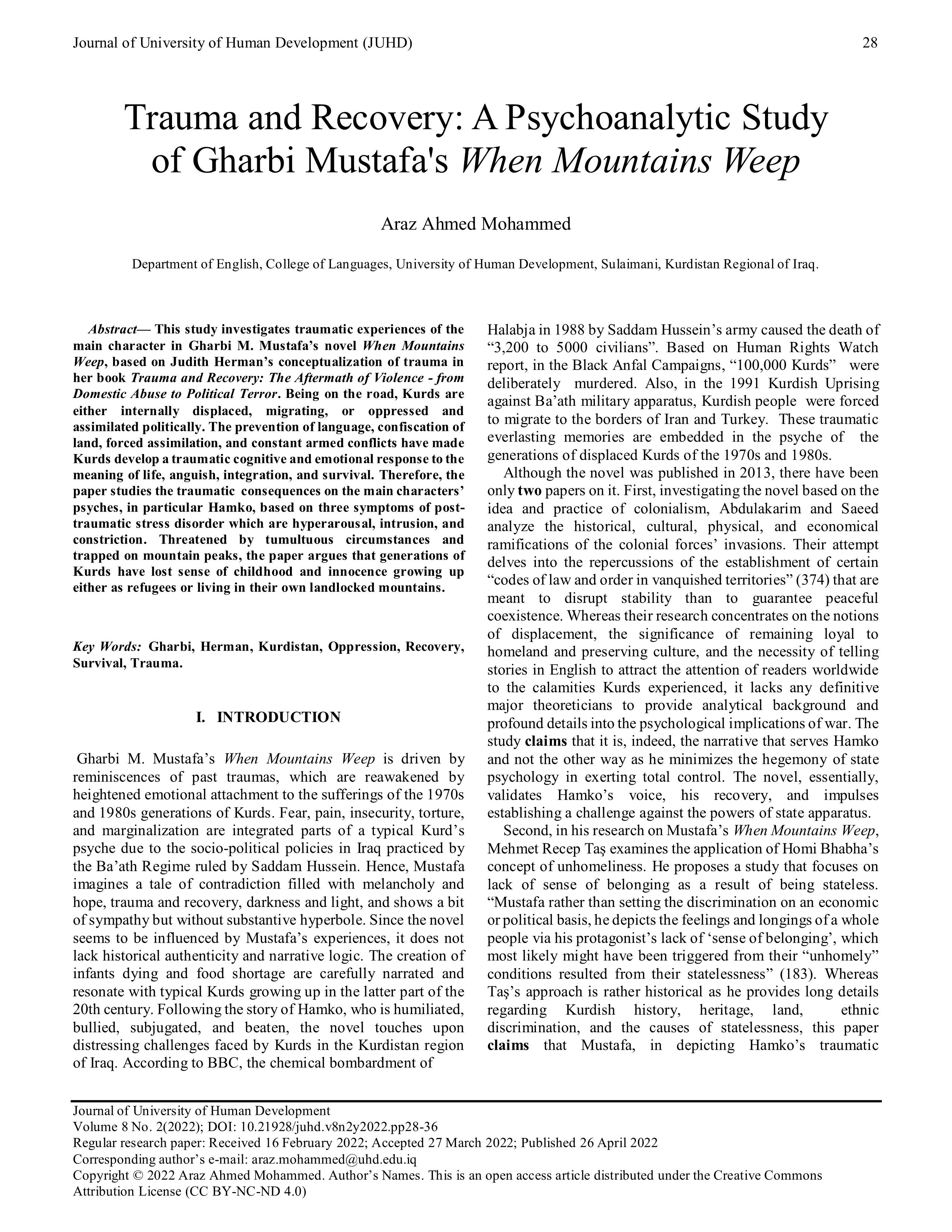Trauma and Recovery: A Psychoanalytic Study of Gharbi Mustafa's When Mountains Weep
DOI:
https://doi.org/10.21928/juhd.v8n2y2022.pp28-36Keywords:
Gharbi, Herman, Kurdistan, Oppression, Recovery, Survival, TraumaAbstract
This study investigates traumatic experiences of the main character in Gharbi M. Mustafa’s novel When Mountains Weep, based on Judith Herman’s conceptualization of trauma in her book Trauma and Recovery: The Aftermath of Violence - from Domestic Abuse to Political Terror. Being on the road, Kurds are either internally displaced, migrating, or oppressed and assimilated politically. The prevention of language, confiscation of land, forced assimilation, and constant armed conflicts have made Kurds develop a traumatic cognitive and emotional response to the meaning of life, anguish, integration, and survival. Therefore, the paper studies the traumatic consequences on the main characters’ psyches, in particular Hamko, based on three symptoms of post-traumatic stress disorder which are hyperarousal, intrusion, and constriction. Threatened by tumultuous circumstances and trapped on mountain peaks, the paper argues that generations of Kurds have lost sense of childhood and innocence growing up either as refugees or living in their own landlocked mountains.
References
Abdulkarim, Chiad & Saeed, Ismael. (2019). Burden of Colonialism and Alienation in Modern Kurdish Novel. International Journal of Kurdish Studies. 5. 373-392. 10.21600/ijoks.530519.
Farrel, Kirby. Post-Traumatic Culture: Injury and Interpretation in the Nineties. Baltimore: John Hopkins UP, 1967.
Herman, Judith L. Trauma and Recovery: The Aftermath of Violence--From Domestic Abuse to Political Terror. New York: Basic Books, 2015.
Jung, C. G. (Gerhard Adler & R. F. C. Hull, Trans.). Collected works of C. G. Jung: Vol. 8. Structure and Dynamics of the Psych. Princeton University Press, 1969. Print.
Maletis, Joelle. The Psychology of Post-Traumatic Stress Disorder. YouTube, uploaded by TED-Ed, 25 June 2018, www.youtube.com/watch?v=b_n9qegR7C4.
Mustafa, G. M. When Mountains Weep. 3rd Ed. 2016.
Respini E, Erickson R. When Home Won't Let You Stay. Yale University Press, 2019; pp. 28–29.
Tal, Kalí. Worlds of Hurt: Reading Literatures of Trauma. Cambridge UP, 1996.
Tas, M. (2016). The sense of belonging and unhomeliness in when mountains weep: coming of age in Kurdistan. International Journal of Linguistics, Literature And Culture (IJLLC), 2(4), 181-189.doi:10.21744/ijllc.v2i4.3241874.
Tyson, Lois. Critical Theory Today: A User-Friendly Guide. New York: Routledge, 2006. Print.
Vickroy, Laurie. Trauma and Survival in Contemporary Fiction. Charlottesville: University of Virginia Press, 2002. Print.
"1988: Thousands Die in Halabja Gas Attack." BBC, 18 Mar. 2022,
http://news.bbc.co.uk/onthisday/hi/dates/stories/march/16/
newsid_4304000/4304853.stm
"Q & A: The Anfal Trial."HRW, 18 Mar. 2022, https://www.hrw.org
/news/2007/06/22/q-anfal-trial?msclkid=6a24ae0da6b711
ecba545a2d10c3cfb1

Downloads
Published
How to Cite
Issue
Section
License
Copyright (c) 2022 Araz Ahmed Mohammed

This work is licensed under a Creative Commons Attribution-NonCommercial-NoDerivatives 4.0 International License.


